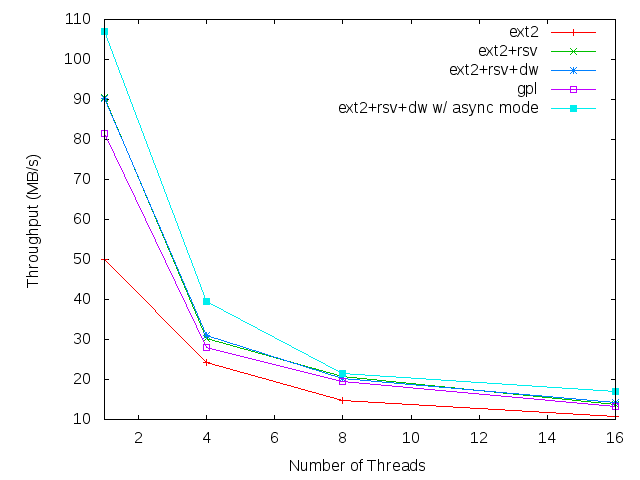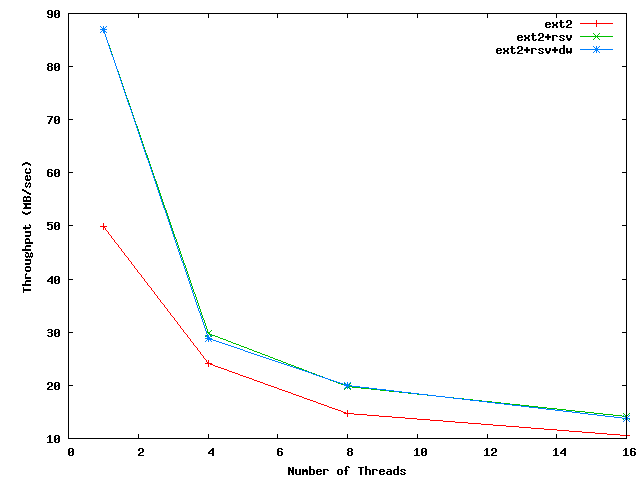Enhance ext2fs to support preallocation and read ext4 file systems
I have finished FreeBSD SoC 2010 this year. please review ZhengLiu to review next works for ext2fs.
Abstract
During GSoC 2009, Aditya Sarawgi created a GPL-free implementation of ext2fs for FreeBSD, which has now been completed. The project is located in /head/sys/fs/ext2fs/. However the GPL-licensed preallocation code is removed.
This project implements preallocation in ext2fs and update ext2fs to be able to read ext4 file systems and possibly add other functionality, such as write ext4 file systems. The newer versions of ext2fs uses a reservation window mechanism. So this project will implement this mechanism.
Mentor
Acknowledgement
Pedro F. Giffuni
Schedule
This schedule do not determined and need to be reviewed by my mentor
April 12 - April 30: Build development system and learn some knowledge, such as building a development kernel, deeply understanding of VFS, ext2fs project and so on
May 01 - May 15: Implement a reservation window mechanism in ext2fs.
May 16 - May 31: Test the performance using iozone, dbench and so on.
June 1 - June10: Add ext4 file system data structure, such as super block, inode. Maybe it just need to modify some source codes in ext2fs.
June 11 - June 30: Add some functions in vfsops.
June 1 - July 15: Add some functions in vnops and modify ext2fs's source code to able to read ext4 file systems.
July 16 - July 31: Test program.
August 01 - August 15: Improve documentation. if possible, I will try to implement write in ext4 file systems
References
Improving Second Extended File system (ext2fs) and making it GPL free (FreeBSD SoC 2009)
Design and Implementation of the Second Extended Filesystem
Benchmarking
I bought a new computer to run my benchmark. The computer has a Intel E5300 CPU, DDR2 800 2GB memory and a Hitachi 7200 RPM 250GB hard disk. I use ministat tool to calculate statistics data.
'ext2' is current implementation without preallocation. 'ext2+rsv(8)' is my implementation with reservation window, which the size of window is 8. 'ext2+rsv+dw' can dynamically increase the size of window. 'gpl' is a FreeBSD 8.0 implementation with preallocation.'ext2+rsv+dw w/ async' is mounted with 'async' mode.
mke2fs /dev/adX mount -t ext2fs /dev/adX <mountpoint>
dbench
I run each benchmark 5 times because these benchmark need to run too long time. The measuring unit is MB/s.
dbench -D <mountpoint> <clientnumbers>
Thread 1:
x ext2
+ ext2+rsv
* ext2+rsv+dw
% gpl
# ext2+rsv+dw w/ async mode
N Min Max Median Avg Stddev
x 5 45.5045 51.5541 51.4006 49.9481 2.3945877
+ 5 89.6299 91.4174 90.9006 90.57168 0.87129257
* 5 88.9354 91.7832 90.6713 90.32766 1.1425207
% 5 79.444 82.9166 81.1734 81.50848 1.4356841
# 5 104.619 108.499 107.003 106.9168 1.4420129Thread 4:
x ext2
+ ext2+rsv
* ext2+rsv+dw
% gpl
# ext2+rsv+dw w/ async mode
N Min Max Median Avg Stddev
x 5 21.4515 26.2088 24.8431 24.13024 1.866238
+ 5 29.2331 31.0921 30.1673 30.21956 0.71182337
* 5 27.5536 33.2609 31.2595 30.9399 2.2345179
% 5 26.941 29.3204 27.2857 27.96066 1.0999782
# 5 30.9833 43.039 41.071 39.40886 4.8328681Thread 8:
x ext2
+ ext2+rsv
* ext2+rsv+dw
% gpl
# ext2+rsv+dw w/ async mode
N Min Max Median Avg Stddev
x 5 14.2031 15.3121 14.7745 14.7199 0.42417473
+ 5 19.1683 21.509 20.9796 20.70498 0.90620942
* 5 19.86 20.7328 20.3172 20.34836 0.34299175
% 5 18.5462 20.3042 19.3613 19.422 0.71459646
# 5 20.5348 22.519 21.2898 21.42142 0.79828509Thread 16:
x ext2
+ ext2+rsv
* ext2+rsv+dw
% gpl
# ext2+rsv+dw w/ async mode
N Min Max Median Avg Stddev
x 5 10.1522 10.996 10.6284 10.62836 0.31219525
+ 5 12.8946 14.3441 13.5806 13.70512 0.60453204
* 5 13.7096 14.6223 14.2731 14.20036 0.33273137
% 5 12.8018 14.0892 13.2879 13.28362 0.50161008
# 5 16.2873 17.7242 17.2376 17.05444 0.65498857
Blogbench
I run each benchmark 10 times. This result is just a score. So it does't have a measuring unit.
blogbench -d <mountpoint>
Write score:
x ext2
+ ext2+rsv
* ext2+rsv+dw
% gpl
# ext2+rsv+dw w/ async
N Min Max Median Avg Stddev
x 10 29 39 33 32.9 3.0349812
+ 10 36 43 37 38.3 2.7507575
* 10 35 44 38 38.2 2.9739611
% 10 31 44 35 35.4 4.376706
# 10 34 50 41 40.1 4.4334586Read score:
x ext2
+ ext2+rsv
* ext2+rsv+dw
% gpl
# ext2+rsv+dw w async
N Min Max Median Avg Stddev
x 10 38714 67212 49050 49344.2 7644.3012
+ 10 38435 60851 49903 48966.5 6510.8627
* 10 45062 68911 50454 51229.2 7278.6375
% 10 61553 100230 70331 73103.6 10791.084
# 10 41226 71295 52230 52605.1 8879.7999
Deprecated Implementation
NOTE: These benchmarks is only for reference.
Reason: The reservation window allocation hit is too low. When the number of threads are not too much (such as less than 4), most of allocation can hit in reservation window. However, When the number of threads are greater than 4, context switch get more frequently. hit ratio gets lower.
Platform
The computer has a Intel E5300 CPU, DDR2 800 2GB memory and a Hitachi 7200 RPM 250GB hard disk. I use ministat tool to calculate statistics data.
'ext2' is current implementation without preallocation. 'ext2+rsv(8)' is my implementation with reservation window, which the size of window is 8. 'ext2+rsv+dw' can dynamically increase the size of window.
dbench
I run each benchmark 5 times because these benchmark need to run too long time. The measuring unit is MB/s.
dbench -D <mountpoint> <clientnumbers>
Thread 1:
x ext2
+ ext2+rsv
* ext2+rsv+dw
N Min Max Median Avg Stddev
x 5 45.5045 51.5541 51.4006 49.9481 2.3945877
+ 5 82.1763 89.3503 88.0009 86.92796 2.8524055
* 5 81.3983 89.4931 88.1687 86.946867 2.8929974Thread 4:
x ext2
+ ext2+rsv
* ext2+rsv+dw
N Min Max Median Avg Stddev
x 5 21.4515 26.2088 24.8431 24.13024 1.866238
+ 5 26.8594 31.9895 29.8409 29.80558 2.0533969
* 5 26.7923 30.9451 28.5845 28.818143 1.6385014Thread 8:
x ext2
+ ext2+rsv
* ext2+rsv+dw
N Min Max Median Avg Stddev
x 5 14.2031 15.3121 14.7745 14.7199 0.42417473
+ 5 17.3095 21.0776 20.4444 19.79332 1.5074286
* 5 17.6481 21.6323 19.8696 19.92342 1.7359695Thread 16:
x ext2
+ ext2+rsv
* ext2+rsv+dw
N Min Max Median Avg Stddev
x 5 10.1522 10.996 10.6284 10.62836 0.31219525
+ 5 10.5891 16.5768 14.2311 14.099983 1.9778735
* 5 10.8098 14.6764 14.0572 13.741214 1.3280996
Blogbench
I run each benchmark 10 times. This result is just a score. So it does't have a measuring unit.
blogbench -d <mountpoint>
Write score:
x ext2
+ ext2+rsv
* ext2+rsv+dw
N Min Max Median Avg Stddev
x 10 29 39 33 32.9 3.0349812
+ 10 26 37 32 32 2.7633971
* 10 32 38 34 34.2 1.8593394Read score:
x ext2
+ ext2+rsv
* ext2+rsv+dw
N Min Max Median Avg Stddev
x 10 38714 67212 49050 49344.2 7644.3012
+ 10 38779 70237 45777 47869.25 8839.6211
* 10 42032 65169 46213 48610.4 6169.217NOTE: This section is deprecated and it is just for reference.
Reason: These benchmark maybe doesn't reflect the real performance because I just run each benchmark three times and the platform is too old.
Platform
I conducted my all benchmarking on my notebook (I just can find this machine, which is idle). This notebook is IBM Thinkpad R51 with a 1.7GHz Intel Centrino CPU (It just have one core). It has a 1.25G DDR memory and a Hitachi 5400 RPM disk with a capacity of 60GB.
I run 3 times per benchmarking and calculate the average. 'ext2' is current implementation without preallocation. 'ext2+rsv(8)' is my implementation with reservation window, which the size of window is 8. 'ext2+rsv+dw' can dynamically increase the size of window.
uname -a FreeBSD lz-freebsd 9.0-CURRENT FreeBSD 9.0-CURRENT #2: Fri May 28 17:31:21 CST 2010
Blogbench
blogbench -d <mountpoint>
r/w |
ext2 |
ext2+rsv(8) |
ext2+rsv+dw |
writes |
6.67 |
7.33 (10.0%) |
7.67 (15.0%) |
reads |
70437.33 |
105083 (49.19%) |
96844 (37.5%) |
Dbench
dbench -D <mountpoint> <clientnumbers>
threads |
ext2 |
ext2+rsv(8) |
ext2+rsv+dw |
1 |
33.9201 |
38.2006 (12.62%) |
61.1552 (80.29%) |
2 |
22.9775 |
22.8349 (-0.62%) |
40.4392 (75.99%) |
4 |
14.3622 |
15.1429 (5.43%) |
16.934 (17.91%) |
8 |
9.4165 |
10.9028 (15.78%) |
12.0248 (27.70%) |
16 |
6.4429 |
7.4228 (15.21%) |
7.537835 (16.99%) |
